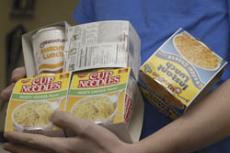Students try to pay the bills
After a long day of classes and work, she squats in front of the low cupboard and reaches for a dusty box. Christie Bagley is making a cake for her roommate’s birthday.
“No, I am not poor. I have everything I need, so I am pretty happy,” she said.
Some students live paycheck to paycheck, just trying to make ends meet.
“Poverty is not starving; it’s people who can’t meet their needs. Just like homelessness – it’s not that they don’t have a home. It is inadequate; it’s condemned housing,” said Elizabeth Szilagyi, co-director of Students Together Ending Poverty club at USU.
According to the Census Bureau, over an adult’s working life, high school graduates earn an average of $1.2 million; associate degree holders earn about $1.6 million; and bachelor’s degree holders earn about $2.1 million. So students are willing to trade a few years of poverty for the long term earning potential, but what is being sacrificed?
Bagley’s grocery bill is $30 every other month. “Mostly I eat at the Marketplace. I get a free meal when I work there,” she said.
The Marketplace feeds her once a day, and that is her main meal. Though she said she never goes hungry, the one thing she gives up is “good-tasting food.”
“Probably my biggest month-to-month expense is utilities, but I pay for all my tuition and housing. Unless I really need help, then my parents can help me out a little,” Bagley said.
“I also eat a lot of pasta,” Bagley said. “To keep from spending money, I don’t go shopping.”
Bagley is the oldest of her family of six, and with both parents working to support her younger brothers, Bagley finds herself almost on her own.
Bagley works two jobs and goes to school full-time.
“Poverty is not by choice; it is not because that person did not work hard enough or should get a better job, and I think that once you overcome that social stigma, you can really help,” Szilagyi said. “It is nothing to be embarrassed about, and it is that social stigma that makes people feel embarrassed when they don’t need to feel ashamed.”
In spite of her scholarship, sometimes Bagley just can’t quite make it, so she uses federal student loans to help cover her expenses.
Mandi Christensen, a graphic design student who was married in December, remembers the days when she was single. “Being single was definitely cheaper than being married, because now you can’t decide that you’re not going to eat for a week so you can buy that shirt,” she said.
“It is like you are really on you’re own when your married,” Szilagyi said.
In the past few months, so much about her life has changed from being a single girl to a wife.
“So many expenses are unexpected like utilities. Rather than splitting the bill, it is really like one person paying it,” Christensen said. “There are also the unexpected expenses, like just last night we went and bought a new dishwasher because the old one broke.”
“I have seen debt tear families apart,” Bagley said.
“Most students at Utah State are afraid of debt,” said Scott Twiss, Zions Bank manager. “People would rather work three jobs than take out a student loan.”
But Mandi and her husband, Cache Christensen, are determined to avoid the problems debt can pose for couples.
“True, not every night is gourmet, like last night we just threw some corn dogs and french fries in the oven,” she said. “But it is really fun just to be together.”
In her kitchen, Bagley closes the oven on her roommate’s birthday cake. “I am not unhappy,” she said. “What is the point on dwelling on what you don’t have? I have what I need.”
-skjohnson@cc.usu.edu

